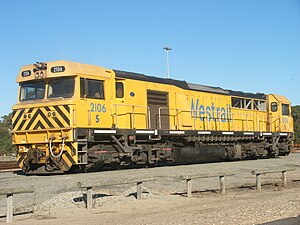| Westrail S class | |||||||||||||||||||
|---|---|---|---|---|---|---|---|---|---|---|---|---|---|---|---|---|---|---|---|
 S2106 in July 2008 | |||||||||||||||||||
| |||||||||||||||||||
| |||||||||||||||||||
| |||||||||||||||||||
| |||||||||||||||||||
The S class are a class of diesel locomotives built by Clyde Engineering, Forrestfield for Westrail in 1998.
History
The S class were the first and only dual-cab locomotives purchased by Westrail. In May 1996 nine were ordered from Clyde Engineering as part of an order that also included 15 1,435 mm (4 ft 8+1⁄2 in) standard gauge Q class locomotives. [1] [2] The order later extended to eleven. [3] [4] They are an evolution of the FreightCorp 82 class. All were assembled at a facility established by Clyde Engineering within Westrail's Forrestfield Depot to fulfill the contract. The frames were built at Clyde's Somerton plant with other components manufactured at Kelso. [5]
The S class locomotives entered service in June 1998 hauling ore and mineral trains in South West Western Australia. [6] All were in service by November 1998 [7]
All were included in the sale of Westrail to Australian Railroad Group in December 2000, with the class redesignated as the 3300 class. [8] In June 2006, all were included in the sale of Australian Railroad Group's Western Australian operation to QR National. [9]
In 2008, Rio Tinto ordered two standard gauge JT42Cs of the same design as the S class for the Weipa bauxite railway, numbered R1005 and R1006. They were delivered in 2009. [10] R1005 remains in service today, while R1006 was withdrawn and scrapped following a collision in September 2019.
References
- ^ "Westrail Loco Contract Signed" Railway Digest July 1996 page 16
- ^ "Intelligence" Railway Gazette International volume 152 issue 8 August 1996 page 475
- ^ "Loco Order Extended" Railway Digest April 1997 page 15
- ^ "Intelligence" Railway Gazette International volume 153 issue 5 May 1997 page 281
- ^ "Westrail S Class" Railway Digest February 1998 page 35
- ^ "S Class Update" Railway Digest August 1998 page 36
- ^ " Westrail S Class" Railway Digest November 1998 page 37
- ^ S Class (diesel, WA) Railpage
- ^ Oberg, Leon (2010). Locomotives of Australia 1850s–2010s. Kenthurst: Rosenberg Publishing. pp. 401–403. ISBN 9781921719011.
- ^ "JT42C Class". mysite.
| Westrail S class | |||||||||||||||||||
|---|---|---|---|---|---|---|---|---|---|---|---|---|---|---|---|---|---|---|---|
 S2106 in July 2008 | |||||||||||||||||||
| |||||||||||||||||||
| |||||||||||||||||||
| |||||||||||||||||||
| |||||||||||||||||||
The S class are a class of diesel locomotives built by Clyde Engineering, Forrestfield for Westrail in 1998.
History
The S class were the first and only dual-cab locomotives purchased by Westrail. In May 1996 nine were ordered from Clyde Engineering as part of an order that also included 15 1,435 mm (4 ft 8+1⁄2 in) standard gauge Q class locomotives. [1] [2] The order later extended to eleven. [3] [4] They are an evolution of the FreightCorp 82 class. All were assembled at a facility established by Clyde Engineering within Westrail's Forrestfield Depot to fulfill the contract. The frames were built at Clyde's Somerton plant with other components manufactured at Kelso. [5]
The S class locomotives entered service in June 1998 hauling ore and mineral trains in South West Western Australia. [6] All were in service by November 1998 [7]
All were included in the sale of Westrail to Australian Railroad Group in December 2000, with the class redesignated as the 3300 class. [8] In June 2006, all were included in the sale of Australian Railroad Group's Western Australian operation to QR National. [9]
In 2008, Rio Tinto ordered two standard gauge JT42Cs of the same design as the S class for the Weipa bauxite railway, numbered R1005 and R1006. They were delivered in 2009. [10] R1005 remains in service today, while R1006 was withdrawn and scrapped following a collision in September 2019.
References
- ^ "Westrail Loco Contract Signed" Railway Digest July 1996 page 16
- ^ "Intelligence" Railway Gazette International volume 152 issue 8 August 1996 page 475
- ^ "Loco Order Extended" Railway Digest April 1997 page 15
- ^ "Intelligence" Railway Gazette International volume 153 issue 5 May 1997 page 281
- ^ "Westrail S Class" Railway Digest February 1998 page 35
- ^ "S Class Update" Railway Digest August 1998 page 36
- ^ " Westrail S Class" Railway Digest November 1998 page 37
- ^ S Class (diesel, WA) Railpage
- ^ Oberg, Leon (2010). Locomotives of Australia 1850s–2010s. Kenthurst: Rosenberg Publishing. pp. 401–403. ISBN 9781921719011.
- ^ "JT42C Class". mysite.


